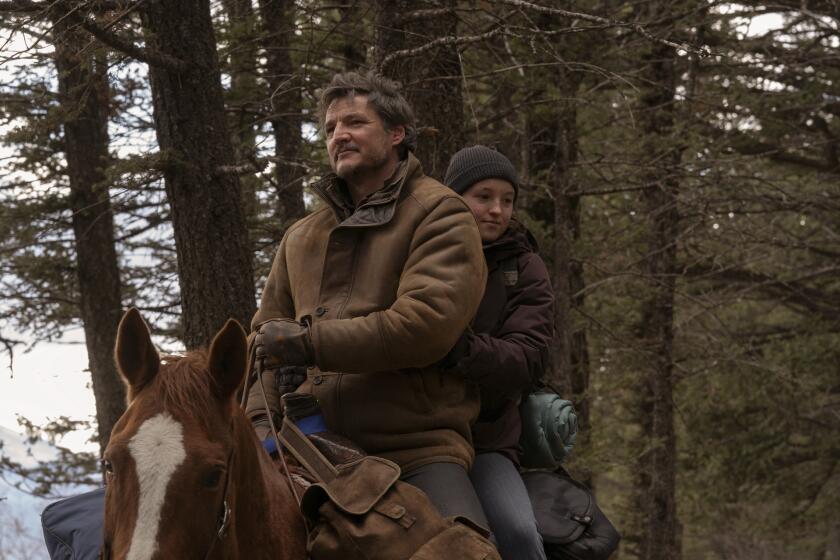L.A. Opera for the late-night cocktail crowd: Checking out the new ‘After Hours’ series
- Share via
The curtain closed on Los Angeles Opera’s performance of Philip Glass’ “Akhnaten,” and a long line formed outside the Founders Room, the Dorothy Chandler Pavilion’s swanky second-floor VIP lounge.
A mix of old and young, wearing everything from denim to couture, was waiting to get into “After Hours: A Musical Nocturne,” L.A. Opera’s new post-show, late-night concert series hosted and curated by company artist-in-residence Matthew Aucoin.
For the record:
4:49 a.m. June 1, 2025This article said Theo Hoffman is a tenor. He is a baritone.
Even after more than three hours of intense opera, these classical fans craved more music.
Or maybe they just wanted a stiff drink and a bite to eat.
Either way, “After Hours” obliged.
As orchestras and opera companies around the U.S. and Europe court Gen X-ers and millennials, casual “indie classical” concerts are proliferating, often held in alternative spaces with low admission prices and plenty of booze and genre-crossing programming.
At Lincoln Center in New York, the Mostly Mozart festival’s “A Little Night Music” series of hourlong concerts has a start time of 10 p.m. and features chamber music accompanied by complimentary wine. London’s Wigmore Hall offers similar programming with its “Wigmore Lates” series.
Other institutions are taking their cues from grassroots movements like San Francisco-based Classical Revolution, Opera on Tap in Brooklyn and Groupmuse, which started in Boston, and embracing the idea of live performance in a super-casual setting, like a bar. In Texas, Fort Worth Opera’s nomadic “Opera Shots!” series draws enthusiastic crowds to its pop-up style performances at breweries, on bar patios and in distilleries.
SIGN UP for the free Essential Arts & Culture newsletter »
L.A. Opera’s “After Hours” functions as a post-show experience with an after-party feel. Admission is free for anyone with an opera ticket. Non-ticket-holders can skip the main show and join the late-night party for $5. Inside, they will find a cash bar and food for sale.
At the first “After Hours” event, held on a Saturday earlier this month, a small crowd melted into the Founders Room’s green velvet couches and gathered around low-slung coffee tables to nosh and chat about the show just experienced.
Aucoin and tenor Theo Hoffman, a member of L.A. Opera’s Domingo-Colburn-Stein Young Artist Program, took a casual approach to the night’s program. The duo weaved through a short program of songs that was equal parts chamber music and acoustic singer-songwriter set. Schubert’s art song “Im Frühling,” with Aucoin on piano, was paired with Bob Dylan’s “Shelter From the Storm,” with Hoffman singing and playing acoustic guitar.
In another pairing that Aucoin introduced as “almost uncomfortably romantic,” Springsteen’s “I’m on Fire” transitioned into Rachmaninoff’s “In the Silence of the Night.”
With easy control, Hoffman’s strong, warm voice filled the space. Adding his own steel-string guitar transcription, the tenor transformed another Schubert lieder, “Du bist die Ruh,” from 19th century art song to 21st century ballad. Although no one was asked to stop talking or put down plates — in fact they were encouraged to do the opposite — the entire room sat mesmerized.
Aucoin and Hoffman closed out their short set with a prescient performance of Leonard Cohen’s “Hallelujah.” Hoffman once again transfixed audience members, several of whom had moved to the floor in front of the piano by the end of the set. In the final chorus, he closed his eyes, spread his arms out like wings and released his powerful voice full-throttle.
Even after a week of Cohen memorials resulting in “Hallelujah” cover overload, this was a performance so visceral, so equally raw and refined, it felt completely fresh.
Emma Alvarez Gibson attended the first “After Hours” and said the experience was what she imagined the salons of an earlier era to be. “It was an elegant, refreshingly simple event,” she later said by email. “What a delight to sit in a beautiful space with people who appreciate art.”
Programs like “After Hours” can work not just because of the later start times and booze, but also because they embrace the original spirit of classical performances.
When Schubert wrote his art songs in the 19th century, they were popular music, and they were presented as such. Over time and through canonization, that music was placed on the top shelf, behind glass.
Giving musicians like Aucoin and Hoffman the freedom to play in an intimate, conversational setting can result in a reinvigorated and palpable connection between audience and music.
“This isn’t just work for us,” Aucoin said between songs. “We’re living and breathing this stuff.” When he was in a band, he said, nobody cared how long the show went on into the night. It was a reminder that, when the music is inspired, no matter the genre and regardless of the setting or time on the clock, music lovers stick around for the good stuff.
------------
“After Hours: A Musical Nocterne”
Where: Founders Room, Dorothy Chandler Pavilion, 135 N. Grand Ave., L.A.
When: Nov. 27, April 15 and May 13
Admission: Included with ticket to L.A. Opera performance; $5 for non-ticket-holders
Follow The Times’ arts team @culturemonster.
ALSO
A tour of the Dorothy Chandler Founders Room
“Akhnaten” review: Philip Glass’ Egyptian pharoah opera
“Akhnaten” star: The man behind the pharoah’s voice
Matthew Aucoin tapped as L.A. Opera’s artist in residence
More to Read
The biggest entertainment stories
Get our big stories about Hollywood, film, television, music, arts, culture and more right in your inbox as soon as they publish.
You may occasionally receive promotional content from the Los Angeles Times.










